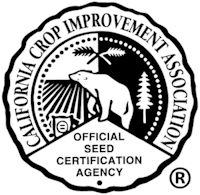Section 5. Variety Eligibility Requirements
All candidate varieties for which certification has been requested will be reviewed according to standard criteria established by AOSCA. A variety may be considered eligible for certification if: (1) it has received a favorable recommendation by AOSCA's Variety Review Board, (2) a certificate has been issued by the Plant Variety Protection Office and all necessary supplemental information has been provided to the CCIA, (3) it has already been accepted for certification by another certifying agency, (4) the variety has been approved for certification under the OECD Seed Scheme, or (5) any variety that has been reviewed and approved by the CCIA's Certification Technical Committee (CTC). The CCIA strongly recommends and may require new varieties be favorably reviewed by the AOSCA Variety Review Board, when one is available. Final acceptance by the CCIA Board of Directors is required for all varieties.
5.1 Certification Technical Committee – The Certification Technical Committee (CTC) is an advisory committee of CCIA charged with reviewing eligibility of varieties for certification, changing or developing new crop standards, and managing technical matters pertaining to seed certification. This committee will review varieties for distinctiveness and genetic stability according to the guidelines established by the AOSCA. Representatives from the CCIA, UCD Department of Plant Sciences, UCD Plant Pathology Department, UCD Foundation Seed Program, California Department of Food and Agriculture (CDFA), and the United States Department of Agriculture (USDA) are eligible to participate on the committee. The CTC meetings are scheduled one month prior to the winter, spring, and fall CCIA Board of Directors meetings.
5.2 Submission of variety for review - To submit a variety for review, an application must be provided. The “Application For Variety Certification” is available online at the CCIA web site. Applicants and breeders wishing to submit an application to the CTC should call the CCIA Office at 530-752-0544 for the application deadlines and dates. The following information is required on the application:
-
Variety name – this must be the established name if the variety has been previously marketed
-
A statement concerning the varieties origin and breeding history
-
Botanical and objective description of the variety; other forms such as the PVP, Exhibit C - Objective Description of Variety or UPOV Table of Characteristics may be used to complete section ‘c’ of the “Application for Variety Certification”. The PVP form is available by searching the USDA website at http://www.ams.usda.gov/AMSv1.0/science and the UPOV form is available at http://www.upov.int/test_guidelines/en.
-
Evidence supporting identity of the variety and any statements or claims made concerning its performance characteristics
-
Area of adaptation and primary use of the variety
-
Procedure for maintaining stock seed classes and number of generations variety may be multiplied
-
Description of how variety is to be constituted if a particular cycle of reproduction or multiplication is required
-
Restrictions with respect to geographic area of seed production, age of stand or other factors affecting genetic purity
-
Should testing be required to verify the presence of a particular trait by the developer, sponsoring breeder or originator before final certification the exact protocols, approved facilities, tolerances, and all other relevant information will be provided to the seed certifying agency that may retain the results of any test for its records.
-
Additional certification requirements: Seed may require additional certification requirements that are clearly referenced in the variety description, provided that the following is completed;
-
Additional certification requirements have been communicated by the sponsoring breeder or originator to all parties involved with regulation and production of variety;
-
The sponsoring breeder or originator shall authorize the seed certifying agency to verify specific characteristics that are referenced in the variety description. Verification of such characteristics will be completed before a certificate (tag) of final certification is issued by the seed certifying agency.
-
-
-
Sample of the seed
-
Information to assist field inspections, including expected variability (kind and frequency) and prominent identifying characteristics of both plant and seed as well as other pertinent field and laboratory information not noted previously
5.3 The Experimental Line Program provides guidelines for seed increase using the CCIA field and seed standards during the final stages of testing an experimental line so that classes of certified seed may be available in the event of the line being release as a variety. The program is to be used for seed production of an experimental line that has not been reviewed or accepted into certification. Seed produced using this program cannot be sold or represented as a class of certified seed, nor should it be included in a certified seed mix or blend until such time sas the experimental line has been accepted as a variety for certification.
-
Definitions:
-
Experimental Line: A germplasm that has not been released and/or recognized as eligible for certification and is being tested with the possibility of release as a variety at some point in the future.
- Classes of Experimental Lines
-
Exp.-F: Eligible for Foundation seed upon variety acceptance.
-
Exp-R: Eligible for Registered seed upon variety acceptance.
-
Exp-C: Eligible for Certified seed upon variety acceptance.
-
-
5.4 Labels
- Tags, labels, or official documents such as Transfer Certificates provided by the CCIA for seed produced using the Experimental Line Program must be clearly marked with the words “Experimental Line” and “Pending Certification”.
- “Foundation”, “Registered”, or “Certified” should not appear on tags, labels, or official documents for seed produced using the Experimental Line program with the exception of wording required in section D1.
- It is recommended that agencies use a buff-colored tag for seed produced under this program.
Completing Certification of seed produced using the Experimental Line Program - In the event that the experimental line meets AOSCA variety eligibility requirements and is accepted for certification, Experimental Line seed stock tags or documents may be replaced by CCIA tags or documents for the appropriate class of certified seed.
| Updated March 2022 | Next Section |
